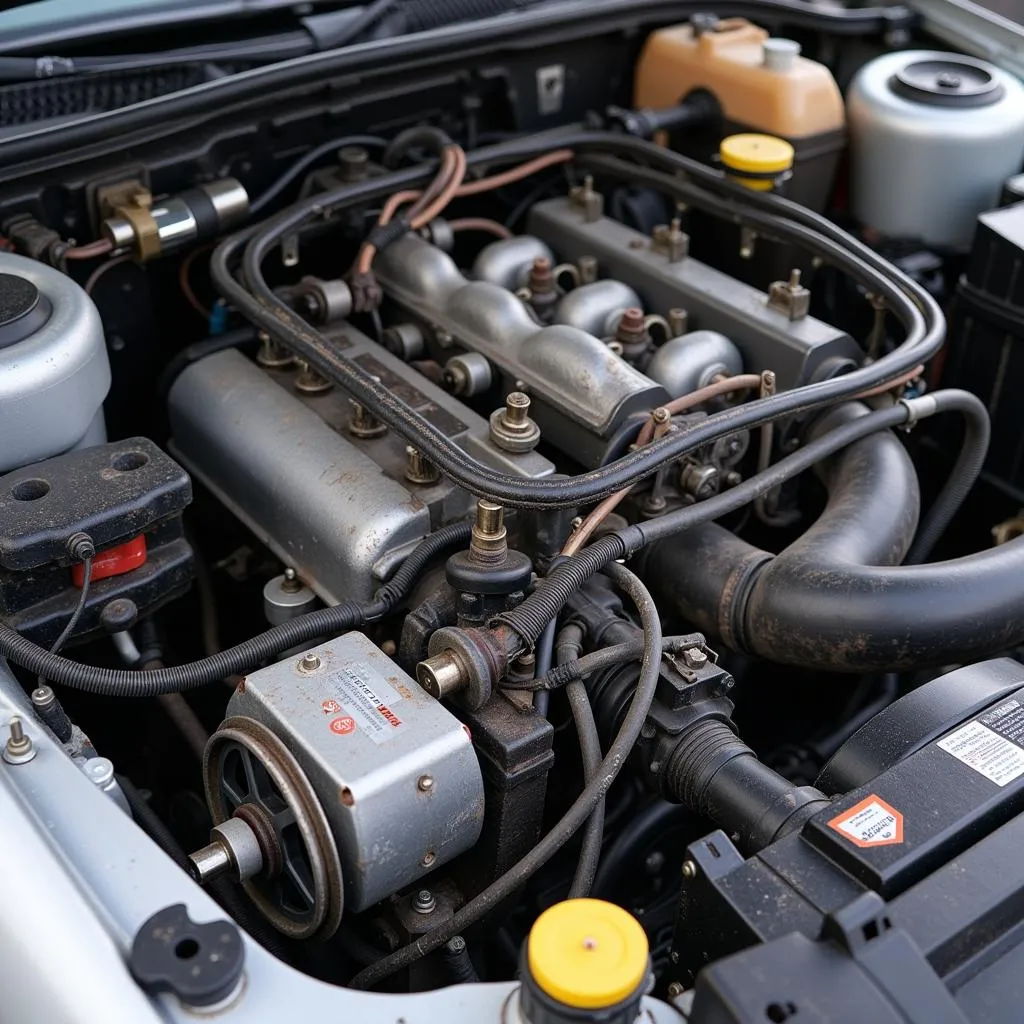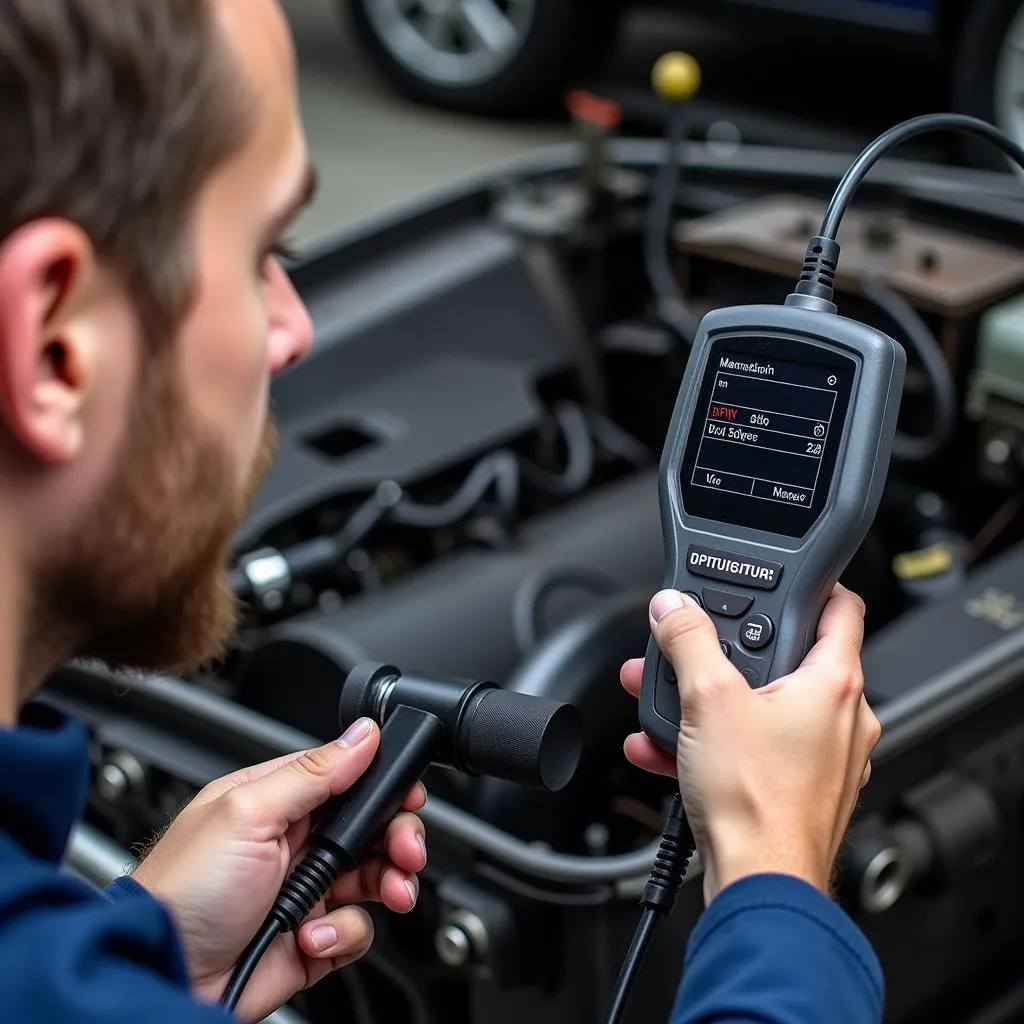Buying a non-running car can seem like a risky proposition, but it can also be a fantastic opportunity to get a great deal on your next vehicle. Whether you’re a seasoned mechanic looking for a project car or simply trying to save money, understanding the ins and outs of purchasing a non-runner is crucial. This comprehensive guide will walk you through everything you need to know, from assessing the potential risks and rewards to negotiating a fair price and navigating the legal requirements.
 Inspecting the engine bay of a non-running car
Inspecting the engine bay of a non-running car
Evaluating the Risks: What Could Go Wrong?
Before diving headfirst into the world of non-running cars, it’s essential to understand the potential pitfalls:
- Hidden Problems: The most significant risk is the unknown. A car that’s not running could have a minor issue or a catastrophic engine failure.
- Costly Repairs: Diagnosing and repairing the problem could cost more than the car’s worth, especially if you’re not mechanically inclined.
- Parts Availability: Finding parts for older or rare models can be challenging and expensive.
- Paperwork Headaches: Ensure the title is clear and there are no outstanding liens.
 Mechanic using a diagnostic tool on a non-running car
Mechanic using a diagnostic tool on a non-running car
Reaping the Rewards: Why Buy a Non-Running Car?
Despite the risks, buying a non-running car offers some compelling advantages:
- Significant Savings: You can often purchase a non-runner for a fraction of its running value.
- Negotiating Power: Sellers are often highly motivated to get rid of non-running cars, giving you leverage during price negotiations.
- DIY Satisfaction: For mechanically inclined individuals, fixing a non-runner can be a rewarding experience.
- Potential Profit: If you have the skills and resources, you can repair the car and resell it for a profit.
Essential Steps Before Buying a Non-Running Car:
1. Determine Your Budget and Mechanical Aptitude:
Set a realistic budget that includes the purchase price, estimated repair costs, and potential parts. Honestly assess your mechanical abilities or consider the cost of hiring a mechanic.
2. Research the Car’s History:
Obtain the vehicle identification number (VIN) and run a history report through services like Carfax or AutoCheck. This will reveal past accidents, title issues, and mileage information.
3. Ask the Right Questions:
Don’t be afraid to ask the seller detailed questions about the car’s history, reason for selling, and any known issues.
4. Conduct a Thorough Inspection:
Even if you’re not a mechanic, visually inspect the car’s overall condition, including the engine bay, body panels, interior, and tires. Look for signs of rust, damage, or neglect.
5. Get a Professional Inspection (If Possible):
If you’re serious about purchasing the car, consider having a trusted mechanic inspect it. They can provide a more comprehensive assessment of its condition and estimate repair costs.
Negotiating a Fair Price:
- Research Comparable Models: Look at the prices of similar running vehicles to gauge a fair starting point for negotiations.
- Factor in Repair Costs: Estimate potential repair costs and factor them into your offer.
- Be Prepared to Walk Away: Don’t be afraid to walk away from a deal if you’re not comfortable with the asking price or if the seller seems evasive.
Legal Considerations:
- Title Transfer: Ensure a smooth title transfer by checking for liens or outstanding loans.
- Bill of Sale: Always get a detailed bill of sale that includes both parties’ information, the purchase price, and the “as-is” condition of the car.
Buying a Non-Running Car: A Calculated Risk with Potential Rewards:
Purchasing a non-running car can be a smart move for those willing to put in the time and effort. However, it’s crucial to go into the process with a clear understanding of the risks involved. By conducting thorough research, asking the right questions, and taking necessary precautions, you can increase your chances of finding a diamond in the rough and driving away with a fantastic deal.
FAQs About Buying a Non-Running Car:
1. Is it legal to sell a non-running car?
Yes, it is legal to sell a non-running car as long as it is clearly stated as such in the bill of sale.
2. Can I get insurance for a non-running car?
Generally, standard auto insurance policies do not cover non-running cars. However, you can obtain specialized storage insurance for protection while the car is not in use.
3. How do I transport a non-running car?
You’ll need to tow the vehicle. Options include hiring a professional towing company or renting a tow dolly or trailer.
4. What are some common reasons why cars don’t run?
Common reasons include a dead battery, faulty alternator, bad starter, fuel system issues, or engine problems.
5. Should I buy a non-running car from an individual or a dealership?
Both options have pros and cons. Individuals might offer lower prices, while dealerships might provide some form of warranty or guarantee.
For those in the market for used vehicles, we have resources on car dealerships that don’t need a driver’s license and options for selling your old vehicle, including information on we buy junk cars tampa and cash for junk cars chattanooga chattanooga.
 Happy car owner working on their restored classic car
Happy car owner working on their restored classic car
Buying a non-running car requires careful consideration and research. While it presents an opportunity to acquire a vehicle at a significantly lower price, it is essential to weigh the potential risks against the rewards. By following the steps outlined in this guide and arming yourself with the right information, you can make an informed decision that aligns with your budget and automotive aspirations. For further assistance and to explore your options, don’t hesitate to reach out to our team. Contact us via WhatsApp at +1(641)206-8880, email us at [email protected], or visit us at 276 Reock St, City of Orange, NJ 07050, United States. Our dedicated customer support team is available 24/7 to address your inquiries.
